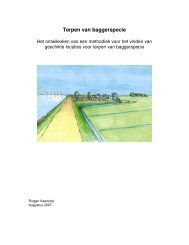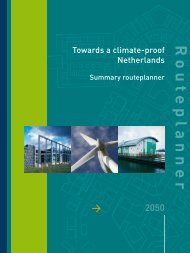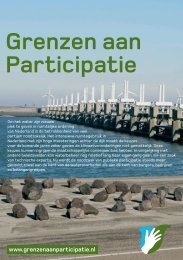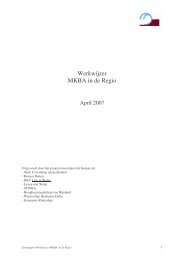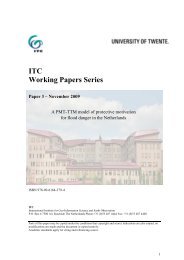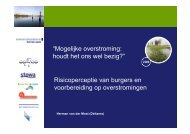Deltas on the move; Making deltas cope with the effects of climate c
Deltas on the move; Making deltas cope with the effects of climate c
Deltas on the move; Making deltas cope with the effects of climate c
- No tags were found...
Create successful ePaper yourself
Turn your PDF publications into a flip-book with our unique Google optimized e-Paper software.
KvR report 001/2006<str<strong>on</strong>g>Deltas</str<strong>on</strong>g> <strong>on</strong> <strong>the</strong> <strong>move</strong>3. <str<strong>on</strong>g>Deltas</str<strong>on</strong>g> and menUnder natural circumstances <strong>deltas</strong> are well adapted to changes in sea levels,sediment loads, river discharges etc. Climate change in itself <strong>the</strong>refore is not a threatto <strong>deltas</strong>. However, over <strong>the</strong> past centuries human interventi<strong>on</strong>s have in many placesparalyzed <strong>the</strong> system’s inherent natural resilience to <strong>climate</strong> change. These may beinterventi<strong>on</strong>s in <strong>the</strong> delta itself (e.g. dikes preventing <strong>the</strong> influx <strong>of</strong> sediments buildingup <strong>the</strong> area), but also interventi<strong>on</strong>s elsewhere in <strong>the</strong> watershed (e.g. afforestati<strong>on</strong>decreasing sediment loads) or in <strong>the</strong> sea (e.g. <strong>of</strong>f-shore harbor developmentaffecting l<strong>on</strong>g-shore drifts). This chapter deals <strong>with</strong> human interventi<strong>on</strong>s in <strong>deltas</strong> andwhe<strong>the</strong>r or not <strong>the</strong>y fit <strong>with</strong>in a system-based approach.3.1 Why do people live in <strong>deltas</strong>?Coastal z<strong>on</strong>es and <strong>deltas</strong> have always been attractive settlement sites. In 2001 overhalf <strong>the</strong> world's populati<strong>on</strong> lived <strong>with</strong>in 200 km <strong>of</strong> a coastline. Eight <strong>of</strong> <strong>the</strong> top tenlargest cities in <strong>the</strong> world are located by <strong>the</strong> coast.One <strong>of</strong> <strong>the</strong> main reas<strong>on</strong>s why people settle in <strong>deltas</strong> is <strong>the</strong> availability <strong>of</strong> food. Thesoil is generally fertile and easy to cultivate. The freshwater <strong>of</strong> <strong>the</strong> river can be usedfor irrigati<strong>on</strong>. In additi<strong>on</strong>, <strong>the</strong>re are <strong>of</strong>ten rich fishing grounds where <strong>the</strong> sea and rivermeet. This has set a precedence for populati<strong>on</strong>s to naturally migrate towards coastalareas.Satellite photograph <strong>of</strong> <strong>the</strong>Nile and its delta. The colorsshow <strong>the</strong> night sky brightness(Cinzano et al., 2002).An example <strong>of</strong> a densely populated delta is <strong>the</strong> Ganges. Between 115 and 143milli<strong>on</strong> people live here, despite from risks from floods caused by m<strong>on</strong>so<strong>on</strong>s, heavyrun<strong>of</strong>f from <strong>the</strong> melting snows <strong>of</strong> <strong>the</strong> Himalayas, and tropical cycl<strong>on</strong>es. It is believedthat upwards <strong>of</strong> 300 milli<strong>on</strong> people are supported by <strong>the</strong> Ganges Delta, andapproximately 400 milli<strong>on</strong> people live in <strong>the</strong> Ganges River Basin, making it <strong>the</strong> mostpopulous river basin in <strong>the</strong> world. Most <strong>of</strong> <strong>the</strong> Ganges Delta has a populati<strong>on</strong> density<strong>of</strong> more than 520 people per square mile, making it <strong>on</strong>e <strong>of</strong> <strong>the</strong> most denselypopulated regi<strong>on</strong>s <strong>on</strong> earth (Wikipedia). O<strong>the</strong>r examples <strong>of</strong> densely populated <strong>deltas</strong>2021



